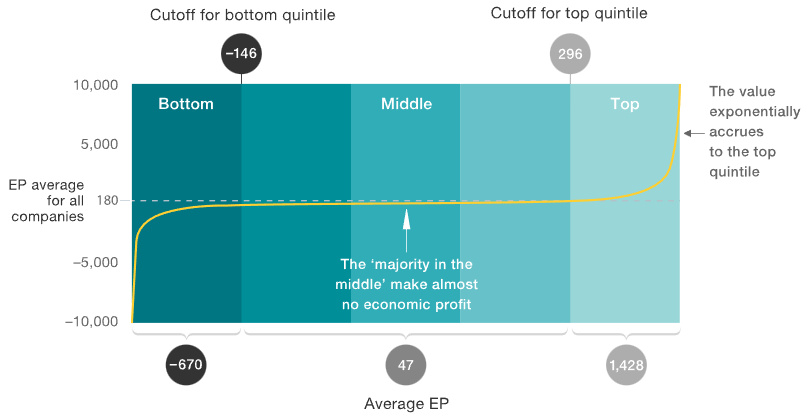Studies show positive correlation between portfolio concentration and performance
A study by Brands et. al., with The University of New South Wales and NYU Stern Business School New York, examined the relationship between portfolio concentration and investment performance across a sample of 37 Australian actively managed institutional equity funds. The results showed a positive relationship between fund performance and portfolio concentration at the stock, industry, and sector levels.
Portfolios that increased overweight positions by one interquartile range resulted in an annual excess return of 3%.
Success, however, was found to be dependent on two vital components of the investment process - stock selection skill and portfolio management. This obviously makes sense; concentration will amplify the investment manager's underlying skill or lack thereof.
That view was proven again empirically in 2016 at the University of Texas where Brown, et al., found that skilled fund managers should (and do) hold more concentrated portfolios. See figure 1 below.
![Figure 1. Simulated investment performance for managers with different forecasting skill and portfolio concentration levels. This display shows the total average annual returns to a base case simulation of a portfolio formation process using a universe of 178 stocks from U.S. markets having a market capitalization of at least $20 billion. Forecast accuracy levels range from FA = 0.0 (no skill) to 2.0 in increments of 0.1. The stock return data is drawn from the period January 2006-December 2014 and a three-year forecast horizon period is assumed. For each manager skill level, portfolios of size 1 < N < 178 are formed, with the simulation including at least 1,000 trials for each [N, FA] combination. Source: Brown, et al., 2016. Texas University.](https://www.livewiremarkets.com/rails/active_storage/blobs/proxy/eyJfcmFpbHMiOnsibWVzc2FnZSI6IkJBaHBBM1paQkE9PSIsImV4cCI6bnVsbCwicHVyIjoiYmxvYl9pZCJ9fQ==--31b6ac8c6d43048d5e6e3664c5e7acdc3f165ddc/2023-9001%20this%20one.png)
Many other studies have confirmed the benefits of relative concentration. Fulkerson and Riley (2019) found that mutual fund performance improves as portfolio concentration increases. Their study found that a single standard deviation increase in concentration improves alpha by 0.24% per year. Goldman, et al. (2016) found empirically that mutual funds with a higher within-sector portfolio concentration exhibit abnormal out-performance. Their findings showed that more concentrated portfolios outperform their more diversified counterparts by 0.50% a year. Interestingly, this study also finds a significant positive correlation between performance and a single investment manager. Performance was shown to deteriorate when two or more managers oversee a portfolio.
As the research studies of UNSW and The University of Texas above highlight, outperformance in concentrated portfolios is dependent on the skill of the investment manager. If managers have the ability to identify companies with high probabilities of increasing economic profit and therefore shareholder value and concentrate their portfolios on such opportunities, they are more portfolios likely to outperform the market.
The findings of these studies are perhaps not surprising when we layer in the skew of stocks towards unprofitable and mediocre outcomes. Research by McKinsey (2018) analysed the economic profit of 2,393 firms over a 10-year period and found that 14% moved from the middle quintile to the bottom while a whopping 78% stayed in the middle making almost no economic profit. Only 8% of all firms moved up into the top quintile. See figure 2 below.

We can also see that these portfolios will be concentrated by the very nature that there is quite a small pool of outperforming companies to choose from as shown by the McKinsey data. If we take a scenario from the population sample above, only 191 companies moved up the power curve to the top quintile. If we assume an investment manager could identify even 50% of those companies (which would be remarkable) we would have 96 potential opportunities. The investment manager would then only be able to invest in those opportunities with a fair or discounted valuation which may have presented again 50% of the preceding total leaving only 48 companies to invest in over 10 years (Many of the economic profit outperformers will have been well overvalued in terms of market valuation during their entire growth period).
The data above suggests investors may experience outperformance by investing across a portfolio of highly skilled and concentrated investment managers. At Blue Oceans Capital we prescribe to the same school of thought and believe that holding a concentrated portfolio of exceptional businesses will lead to market outperformance over the long-term.
Never miss an insight
If you're not an existing Livewire subscriber you can sign up to get free access to investment ideas and strategies from Australia's leading investors.
And you can follow my profile to stay up to date with other wires as they're published – don't forget to give them a “like”.
5 topics

